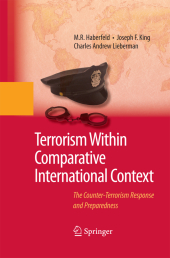 Neuerscheinungen 2014Stand: 2020-02-01 |
Schnellsuche
ISBN/Stichwort/Autor
|
Herderstraße 10
10625 Berlin
Tel.: 030 315 714 16
Fax 030 315 714 14
info@buchspektrum.de |

M. R. Haberfeld, M.R. Haberfeld, Joseph F. King, Charles A. Lieberman
(Beteiligte)
Terrorism Within Comparative International Context
The Counter-Terrorism Response and Preparedness
2009. 2014. xiv, 176 S. 2 Tabellen. 235 mm
Verlag/Jahr: SPRINGER, BERLIN; SPRINGER NEW YORK; SPRINGER 2014
ISBN: 1-489-98383-X (148998383X)
Neue ISBN: 978-1-489-98383-1 (9781489983831)
Preis und Lieferzeit: Bitte klicken
Local law enforcement is key to the war on terror, but there´s a limit to how far citizens want their police to go. This book covers law enforcement training and techniques that are both effective against terror and amenable to citizens.
The introductory chapter of this book presents the concepts of the bene?ts inherent in the study of comparative approach for an effective counterterrorism response on the local law enforcement level and overviews the inception of the project. Throughout the twentieth century and into the twenty-?rst century, especially after the events of September 11, 2001, the legitimacy of law enforcement practices has been cited as a major concern for international criminal justice. As policing pr- titioners and scholars throughout the world shifted focus from a traditional reactive, crime control stance to the need for accountability mechanisms to ensure the s- port of citizenry in combating crime and terrorism, the democratization of policing was seen as the best mechanism for achieving long-term gains in public order at the same time as protecting human rights. While the need to maintain human rights remains an important issue, balancing these concerns with the important public safety interests of societies is paramount.
Acknowledgments
Chapter 1. Introduction
Chapter 2: The Comparative Approach to Counter-Terrorism
Section 1. Countering Terrorism with Community Oriented Policing?
Chapter 3: Methodology
Section 1. Qualitative versus Quantitative Data Collection
Section 2. Focus Groups
Chapter 4: United Kingdom and Ireland
Section 1. History
Section 2. Terrorism
Section 3. United Kingdom Law Enforcement
Section 3a. Ireland Law Enforcement
Section 4. United Kingdom Field Research
Section 4a. Ireland Field Research
Chapter 5: The Kingdom of the Netherlands (Koninkrijk der Nederlanden)
Section 1. History
Section 2. Terrorism
Section 3. Law Enforcement
Section 4. Field Research
Chapter 6: The Kingdom of Spain (Rieno de Espa¤a)
Section 1. History
Section 2. Terrorism
Section 3. Law Enforcement
Section 4. Field Research
Chapter 7: The Kingdom of Sweden (Konungariket Sverige)
Section 1. History
Section 2. Terrorism
Section 3. Law Enforcement
Section 4. Field Research
Chapter 8: Republic of Turkey (Turkiye Cumhuriyeti)
Section 1. History
Section 2. Terrorism
Section 3. Law Enforcement
Section 4. Field Research
Chapter 9: Germany
Section 1. History
Section 2. Terrorism
Section 3. Law Enforcement
Section 4. Field Research
Chapter 10: United States
Section 1. History
Section 2. Terrorism
Section 3. Law Enforcement
Section 4. Field Research
Chapter 11: Best Practices - Lessons we Learned
Section 1. Intelligence File
Section 2. Investigation/Interrogation Techniques
Chapter 12: Best Practices - Lessons to be Learned
Section 1. Conclusion
Section 2. Outline of a C-T Training Module
Appendix A: IRB Approved Consent Form
Appendix B: IRB Review Form


